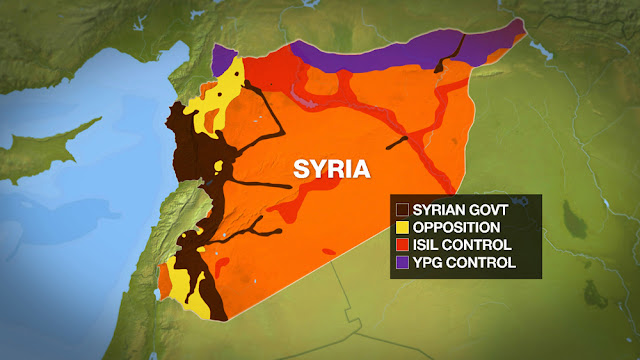 |
| Syria War: Blasts kill 129 in Damascus and Homs |
A series of suicide bombs near a Shia shrine in Damascus and in Homs have killed at least 129 people on a day the United States and Russia claimed progress in securing a ceasefire to end the Syrian conflict.
The Islamic State of Iraq and the Levant (ISIL) group, which has seized territory in Syria and Iraq, claimed that it was behind Sunday's attacks, which killed at least 63 in Damascus and 46 in Homs.
Some sources put the death toll higher.
SANA, the official government news agency, said a car bomb followed by two suicide attacks in the area of Sayyida Zeinab shrine killed 83 people and left 178 others, including children, wounded.
The Syrian Observatory for Human Rights gave a lower toll of 63 dead but said many of those wounded were in critical condition.
At least 60 shops were damaged and cars were totally destroyed, the AFP news agency reported.
At the end of January, bombings claimed by ISIL killed at least 70 people near the same shrine.
Sayyida Zeinab is believed to contain the grave of a granddaughter of Prophet Muhammad and is particularly revered as a pilgrimage site by Shia faithful.
Homs double bombing
The blasts in Damascus came only hours after dozens of civilians were killed in a double car bombing in the central city of Homs.
SANA said the attack happened near the entrance to al-Arman neighbourhood, with the Syrian foreign ministry saying that at least 46 people died and dozens were wounded.
The Syrian Observatory reported that two car bombs killed at least 57 people and wounded dozens in Homs' pro-government district of Al-Zahraa.
Residents of the area are mostly from the same Alawite sect of Shia Islam as Syria's ruling clan.
Homs is largely under government control and has regularly been targeted in bomb attacks.
The violence on the ground in Syria came on a day the US secretary of state said that a "provisional agreement" had been reached on a ceasefire to end the ongoing war.
John Kerry, speaking in Amman alongside Nasser Judeh, Jordan's foreign minister, said he had spoken earlier that morning with his Russian counterpart, Sergey Lavrov, about the agreement.
Now, he said, both the US and Russia planned to reach out to the various sides of the conflict.
Kerry said he hoped that President Barack Obama and Russian President Vladimir Putin would talk soon and implementation could begin after that.
He said the details such as enforcement still needed to be resolved and that the international community was "closer to a ceasefire today than we have been".
The Russian foreign ministry confirmed that Lavrov and Kerry had spoken about conditions for a ceasefire in Syria on the telephone on Sunday.
It said the discussions were on ceasefire conditions, which would exclude operations against organisations "recognised as terrorist by UN Security Council".
On Saturday, a number of Syrian opposition groups said that they agreed to the "possibility" of a temporary truce if President Bashar al-Assad's government and its allies respect several conditions, including a ceasefire.
The groups said that they would agree provided there were guarantees that government forces and its allies would respect a ceasefire, sieges were lifted and aid deliveries permitted across the country.
The declaration came as fighting continued on the ground despite a Friday deadline for cessation of hostilities.
The opposition factions "expressed agreement on the possibility of reaching a temporary truce deal, to be reached through international mediation", a statement from the High Negotiations Committee said.
IN DEPTH: The politics of war crimes in Syria
It said that the UN must guarantee "holding Russia and Iran and sectarian militias ... to a halt to fighting".
All sides should cease firing simultaneously and the government should release prisoners, the statement said.
For his part, Assad said in an interview with Spanish newspaper El Pais on Saturday that he was ready to implement a ceasefire but only if the rebels and their international backers such as Turkey did not use it as a chance to gain ground.
The fighting in Syria started as an unarmed uprising against Assad in March 2011, but has since expanded into a full-on conflict that has killed more than 260,000 people, according to UN estimates.
Millions more have been displaced, having fled to neighbouring countries and Europe.
Source: Al Jazeera and agencies
